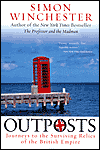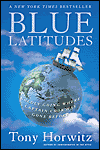May 31, 2006
Voyages Round My Bookcase**
For some reason, I seem to have been bitten by the historickal travel bug because that is the sort of book I've been reading recently.
First, I just recently finished this:

Outposts: Journeys to the Surviving Relics of the British Empire by Simon Winchester.
I had read and liked Winchester's book Krakatoa, about the eruption of that volcano in 1883 and its global effects, so I was all set to be pleased with this tour of the dozen or so territories that comprise what is left of the British Empire.
Well, in general I was pleased. Winchester provides plenty of interesting facts about places one has barely even heard of before: Tristan da Cunha, St. Helena, Ascencion, the Turks & Cacaos, the Diego Garcia group, Pitcairn Island, etc. But at the same time, I found the book to fall a bit flat. For one thing, Winchester is in the odd position of appearing to be a Good Labourite who also happens to have a nostalgic regard for the Empire, which strikes me as somewhat paradoxical. Praise for the genuine benefits the Brits brought to the Peoples they subjected does not sit well with praise of the virtues of indiginous autonomy: Winchester reminds me at times of a one-man People's Judean Front from Monty Python's Life of Brian, argueing with himself over the merits of Roman occupation. ("Okay, other than roads, sanitation, safety, education and technology, what have the bloody Romans ever done for us?") Also, in good Labourite fashion, Winchester seems to see the various territories' economic plights clearly (most of them are in fairly poor shape), but his suggested response seems to be to throw more government money and "programs" at them.
Second, Winchester takes a number of gratuitous swipes at America and Americans, whom he plainly does not like. This book was written in the mid-80's and he is particularly indignant about the American military presence in Bermuda and Diego Garcia, taking that blinkered, myopic view I've seen in others that if the crazed American gun-slingers would just go away, somehow the Soviet threat would vanish as well. He also is both wistful and indignant about American economic opportunity: for example, he at once dislikes and envies the success of the U.S. Virgin Islands as he looks across the straits from the much shabbier and taudry British VI's. Finally, the paperback edition I have contains an introduction written in 2003, in which Winchester rails against the Forces of Globalization (American in origin), warning of the rise of a new empire that was likely to do such horrendous things as provide jobs and consumer goods while at the same time raising standards of living in otherwise hopeless backwaters. It struck me as somewhat fantastical that he should carry on in this way while totally ignoring another worldwide empire on the rise, one that instead of trying to sell you things, will slit your throat if you don't bow down to its tenants, however medieval.
One other thing: Winchester's description of a visit to Hong Kong doesn't come close to P.J. O'Rourke's in Eat the Rich, either in terms of entertainment value or in terms of understanding Hong Kong's history and politics. Sorry, but it's true.
Nonetheless, I'm glad I read this book and probably will do so again.
Next, I am currently reading this:

Blue Latitudes: Boldly Going Where Captain Cook Has Gone Before by Tony Horwitz.
As the title implies, Horwitz decided to trace the voyages of Captain James Cook and revisit the places Cook had done two hundred odd years earlier.
I confess that I've only just started this book, but so far it is excellent. Horwitz's description of his stint as a hand on a reproduction of Cook's ship Endeavor is quite entertaining. His analysis of Cook's personality and talents (and of the relationship between Cook and Joseph Banks, the great naturalist who accompanied him) is both fair and appreciative, in large part because Horwitz remembers (and reminds his readers) that Cook lived in the 18th Century, not the 21st. And his descriptions of the modern-day versions of the places Cook saw (so far, I've only got as far as Tahiti) seem to be neither preachy nor romanticized. I very much look forward to, er, sailing through the rest of this book.
*** Bonus points for spotting the literary allusion.
I read the original edition of Outposts--which came out in 1986 or thereabouts--and quite liked the book. Of course, back then I was deep in what I like to call my Stupid Phase, so most of the points you criticize are things at which I would have nodded agreeably. I did like the closing section where Winchester noted how shamefully lax Britain was (and is) about giving the people who live on these specks any representation in the central government. The French have done better, for heaven's sake.
It sounds like Winchester's anti-Americanism has grown a lot shriller, but then so has everyone else's. The whole anti-American, anti-business, self-flagellating "progressive" mindset was a lot more palatable when it was more genteel.
Posted by: utron at May 31, 2006 03:31 PMI just finished Winchester's latest book, "A Crack in the Edge of the World," about the 1906 SF earthquake. It was OK, but not as good as "Krakatoa." He did manage to take gratuitous swipes at America, Wal-Mart, and President Bush.
Posted by: ChrisN at May 31, 2006 07:50 PMIs the original version of "Outposts" entitled "The Sun Never Sets"? If so, I own and read it. Quite a nice little book. For many years I owned a t-shirt from the officers club at the British Naval station on Deigo Garcia. It was a prized posession given to me by a navy man who visited Deigo Garcia in the 80s. Alas... As with all t-shirts, it had its day. When it was done in it became a gun-cleaning rag...
Posted by: The Maximum Leader at June 1, 2006 09:58 AM

 Image courtesy of the lovely and talented
Image courtesy of the lovely and talented 